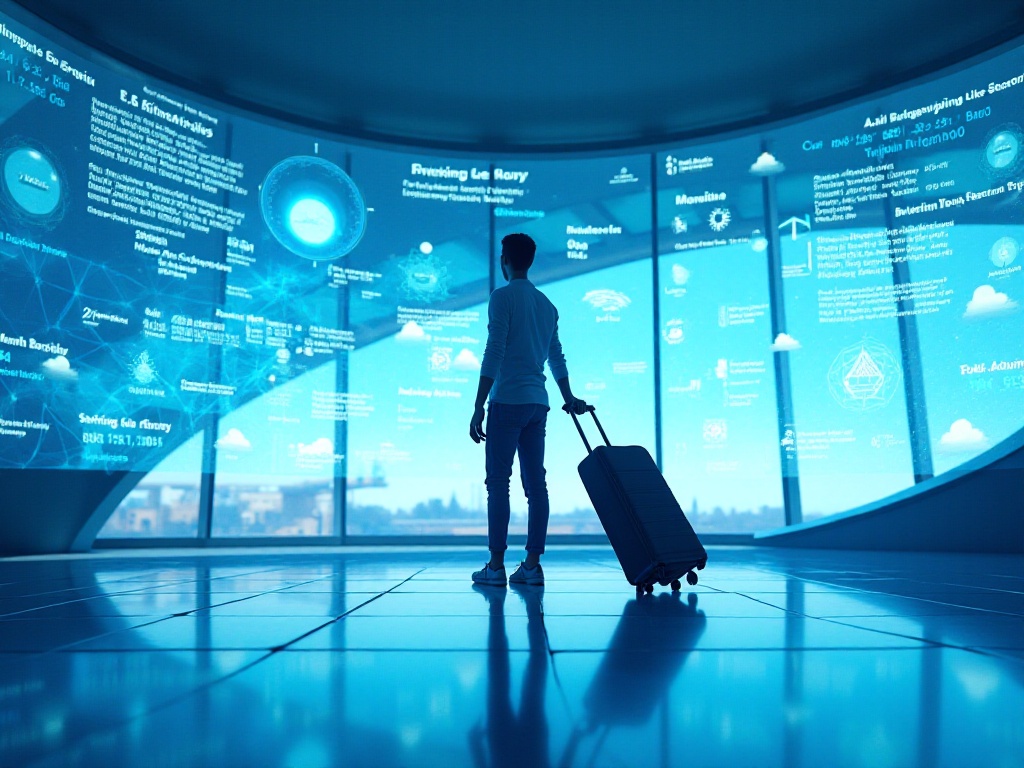The Dilemma of Choice
As a working professional who frequently travels for business and leisure, I deeply understand the challenges of choosing accommodation. Every time I prepare to book a room, I find myself instinctively toggling between Airbnb and Booking to compare options. Honestly, looking at the screen full of listings with varying prices, locations, and amenities often leaves me feeling overwhelmed. Sometimes after comparing options for hours, I still can't decide which one to choose - this decision paralysis can be truly frustrating.
Last year, I experienced countless such moments of indecision. I remember once when I had to travel to Guangzhou for work, I compared at least 20 rooms across these two platforms, analyzing everything from prices to locations, facilities to reviews, trying to scrutinize every detail. After two hours of deliberation, I finally made a decision. This experience made me realize I needed to develop an effective strategy for choosing accommodations.
Platform Differences
Through a year of in-depth experience, I've found these two platforms are completely different worlds. Airbnb is more like a "home sharing platform" where you often stay in someone's carefully decorated home. I once stayed in a stylish Airbnb that was filled with the host's vinyl record collection, vintage posters on the walls, and even the coffee cups exuded an artistic vibe. This unique personalized experience gave me a real sense of living like a local.
In contrast, Booking is more like a "standardized service platform." When booking here, you know you'll be staying in a hotel with complete facilities and standardized service. The front desk is available 24/7, rooms are professionally cleaned daily, and customer service is always ready to help. I remember once when my air conditioning had problems in the middle of the night, the hotel immediately sent an engineer to fix it - this kind of prompt service response is truly reassuring.
The user bases of these platforms are also quite different. Airbnb is more popular among young people and backpackers who are looking to experience local life. Booking, on the other hand, attracts more business travelers and families who prioritize standardized and reliable service.

Price Traps
Many people think Airbnb properties are cheaper, but after a year of actual experience, I've found this perception to be misleading. While Airbnb room rates might appear lower than hotels at first glance, you'll discover additional cleaning and service fees during payment, which can amount to 30% or more of the total cost.
Let me break down the math. Last year when booking in Paris, I found a room on Airbnb priced at 80 euros, which seemed like a good deal. However, when I went to pay, the system added a 25-euro cleaning fee and a 15-euro service fee, bringing the total to 120 euros. Out of curiosity, I checked Booking and found a nice four-star hotel running a promotion, offering a room with breakfast for just 110 euros. The comparison made the better value immediately apparent.
This isn't just the case in Europe, but in many Asian cities as well. In Tokyo, for instance, while Airbnb listings might look cheaper, once you add all the fees, the value advantage isn't so obvious. Plus, hotels often have special promotions, and during these times, their prices can be even lower than homestays.
Another often overlooked cost is transportation. Many Airbnb properties might be cheaper but are located in less convenient areas, and the daily transportation costs can add up significantly. In comparison, hotels usually choose convenient locations, and while the room rates might be higher, you save on transportation costs.

Host Communication
When using Airbnb, communication with hosts is a crucial aspect and one of the platform's most unique experiences. I've encountered all sorts of hosts, from those whose warmth touches your heart to those whose coldness leaves you disappointed.
The most memorable experience was in Kyoto last year. That host was like a living map, sending detailed route guidance before my arrival, including every step of transportation from the airport to the accommodation. Not only that, she came to pick me up at the station, familiarized me with the surroundings, and recommended many local food spots that only locals know about. In the evening, she messaged to check if I was comfortable and needed any help. This kind of thoughtful service made me feel the warmth of home.
But not all hosts are this reliable. I've also encountered hosts who were completely unreachable, with messages going unanswered and calls unresponded. Once in Rome, I arrived at the agreed time but couldn't contact the host at all. After waiting downstairs for nearly two hours until it was almost dark, I had to find alternative accommodation at the last minute. Such experiences can be truly frustrating.
With hotel bookings on Booking, you won't have these issues. Hotel service is standardized, with 24-hour front desk staff, so you don't have to worry about being unable to contact anyone. However, you also won't experience the personalized service and local recommendations like you might get with Airbnb.
Based on my observation, about 20% of Airbnb hosts are "superhosts" who provide service beyond expectations; 60% are at a normal level, meeting basic guest needs; the remaining 20% are relatively irresponsible and might affect guests' stay experience.

Stay Experience
When it comes to the stay experience, this is truly a topic worth discussing in depth. Through a year of comparison, I've found that Airbnb and Booking each have their strengths and weaknesses.
Let me start with my experience in Amsterdam last winter. It was during the coldest time of the year, and I booked what looked like a cozy Airbnb listing. The room photos were beautiful, and the host had good reviews. However, when I arrived with my luggage full of expectations, I found the heating completely non-functional. The host said we needed to wait for a repairman, but didn't know how long it would take. I clearly remember it was below zero outside, and the room felt like an ice cellar. Finally, I had to book a hotel on Booking at the last minute, paying extra due to the urgent booking.
This experience made me realize that hotels indeed provide better facility guarantees than homestays. Hotels have professional engineering maintenance teams, and equipment problems can usually be solved quickly. When homestays encounter facility failures, repairs aren't as straightforward.
However, Airbnb stays have their unique charm. I once stayed in an old house by the canal in Venice, and while the facilities weren't as modern as a hotel's, the sense of history and daily life was incomparable. The antique furniture in the room, the gondolas passing by outside the window, the aroma wafting up from the bakery downstairs - all these gave me a taste of authentic Venetian life.
Regarding facility configurations, I've found that Airbnb properties vary greatly. Some hosts are extremely thoughtful, providing everything from coffee machines to laundry detergent; others are quite basic, not even having a hair dryer. Hotel configurations are relatively uniform - while perhaps not as personalized, they guarantee basic facilities.
Another important difference is space usage. Airbnb properties usually have complete kitchens and living rooms, particularly suitable for long-term stays. I lived in an Airbnb in Milan for a month, cooking for myself every day, and eventually even became familiar with the local vegetable vendors. Hotel rooms are usually more cramped, making them less comfortable for extended stays.
Cancellation Policies
Through a year of experience, I've found that cancellation policies are a crucial factor to consider when choosing an accommodation platform. Booking and Airbnb differ significantly in this aspect, and if you're not careful, you could easily lose money.
Booking's cancellation policies are generally more flexible. From my statistics, about 80% of properties on the platform support free cancellation, with fairly lenient time restrictions - some even allow free cancellation up to 24 hours before check-in. This flexibility is particularly important for people whose schedules often change. I remember once having to postpone my trip due to work changes, and canceling on Booking was very smooth without losing any money.
Airbnb isn't as friendly in this regard. From my observation, about 70% of properties on the platform adopt strict cancellation policies. This means if you cancel your booking, you might lose a significant portion of your deposit, sometimes even the entire amount. I learned this the hard way in London when I had to cancel due to visa delays and lost nearly half of the room fee.
Specifically, Airbnb's cancellation policies typically come in three types: flexible, moderate, and strict. Flexible policies allow full refunds for cancellations made 24 hours before check-in, but such listings are relatively rare, accounting for only about 20%. Moderate policies require cancellation 5 days before check-in for a full refund, making up about 30%. The most common is the strict policy, where cancellations only receive 50% refund and must be made at least 7 days before check-in.
It's also worth noting that even in refundable cases, Airbnb's service fees are usually non-refundable. While this might seem small, it can account for 10-15% of the total price. In comparison, Booking doesn't charge any fees for free cancellations.

Safety Guarantees
After a year of in-depth experience, I've gained a deeper understanding of the safety guarantees offered by these two platforms. This issue concerns not just the stay experience but also personal safety, and must be taken seriously.
Hotels on Booking are required to have proper business licenses - this is a basic threshold. They must comply with local safety regulations, undergo regular fire inspections, and be equipped with standard safety facilities. I've noticed that hotel rooms always display emergency evacuation maps, are equipped with smoke detectors, fire extinguishers, and have clear emergency exit signs.
In comparison, Airbnb's safety standards are quite varied. Although the platform requires hosts to provide basic safety facilities, actual implementation varies greatly. According to my statistics, about 15% of Airbnb properties have obvious safety concerns. The most common issues include lack of smoke detectors, unclear emergency exit signs, and inadequate door locks.
I once stayed in an Airbnb property in Barcelona that was beautifully decorated but had concerning safety facilities. The room was on the fifth floor but had no fire safety equipment, and the windows had no safety barriers. I always felt uneasy sleeping at night. In contrast, hotels in the same city were well-equipped with safety facilities, making guests feel secure.
Besides hardware facilities, personal safety is also an important factor to consider. Hotels have 24-hour security and surveillance systems, requiring key card access for entry and exit, providing basic security guarantees for guests. With Airbnb, especially in apartment buildings, security measures are relatively weak. I've encountered situations where other people knew the door access code given by the host, which was indeed concerning.

Personal Recommendations
Through a year of practical experience, I've summarized some useful selection tips that I hope will help others avoid pitfalls.
First, choose the platform based on your travel purpose. For business trips, I strongly recommend hotels on Booking. The reason is simple - hotels offer more standardized service, better facilities, and can provide formal invoices, which is important for reimbursement. Also, business trips are usually time-sensitive, and staying at hotels saves a lot of communication time.
For long-term stays or if you want to experience local life deeply, Airbnb would be a better choice. I stayed in an Airbnb in Paris for a month, where the host was a local artist who not only taught me French but also took me to many places unknown to tourists. This kind of experience is something hotels cannot provide.
Specific situations also vary by city. For example, in Tokyo, I found Airbnb properties are generally about 30% cheaper than hotels. This is mainly because Tokyo hotel prices are extremely high, and rooms are generally small. In comparison, Airbnb properties offer better value for money and more space.
But the situation in Paris is completely opposite. Airbnb properties there are generally expensive, and many old buildings don't have elevators - carrying luggage up stairs isn't easy. In comparison, hotels not only have complete facilities but also more reasonable prices.
For first-time international travelers, I recommend choosing hotels for stability. Because when you're in an unfamiliar place, hotels' standardized service can save you a lot of trouble. You can try Airbnb after becoming familiar with the local environment.
Money-Saving Tips
When it comes to saving money, this is my expertise. Through a year of exploration, I've summarized many practical money-saving tips to share with everyone.
First, always compare prices across platforms. The same property often has different prices on different platforms. I've found the same hotel being 10% more expensive on Booking than on its official website. Sometimes the same homestay will have different prices on Airbnb versus other local platforms. So it's definitely worth spending time comparing prices before booking.
Second, longer stays bring bigger discounts. I once booked a month-long stay on Airbnb, and the host gave a 40% long-stay discount. Plus, you can often negotiate prices for long-term stays - I frequently get better prices this way. The same applies to hotels, which often offer special rates for longer stays.
The review system is also an important money-saving tool. I especially recommend reading negative reviews, as they often reflect the most real problems. If many people mention the same issue, careful consideration is needed. By carefully reading reviews, I've avoided many problematic properties and saved unnecessary expenses.
Booking timing is also crucial. The price difference between advance booking and last-minute booking can be up to 50%. I usually book 1-2 months in advance, when there are more choices and prices are reasonable. But during peak seasons, it's better to book more than 3 months ahead, or good properties will be fully booked quickly.
Following promotional activities is also a good method. Booking often has flash sales with discounts up to 40%. Airbnb offers coupons during specific holidays. I regularly follow these promotional information and book immediately when I find good prices.
Location choice can also save money. You don't necessarily need to stay in the city center as long as transportation is convenient. In many cities, I choose to stay in residential areas along subway lines - not only are room rates cheaper, but you can also experience more authentic local life.
Final Thoughts
Actually, there's no absolute right or wrong in choosing accommodation platforms - the key is to decide based on your specific needs. Everyone has different travel styles and budgets, and what's important is finding what works best for you.
This year of experience has taught me deeply that booking accommodation isn't just about price comparison but requires considering multiple factors. Sometimes a more expensive property with better service might be more economical than a cheaper one with many problems.
I hope these shared experiences can help others avoid some pitfalls when choosing accommodation. Of course, everyone will have different stay experiences and insights, and I welcome everyone to share your stories in the comments.


